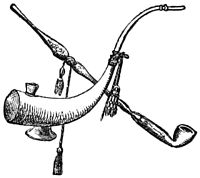which allowed him no freedom, but vigorously compelled him to work like a slave. Consequently he has left the gymnasium with an education which is so extensive and complete, that the most a university can do for it is to perfect some of its profounder specialties. It is said that when a pupil leaves the gymnasium, he not only has a comprehensive education, but he knows what he knows,—it is not befogged with uncertainty, it is burnt into him so that it will stay. For instance, he does not merely read and write Greek, but speaks it; the same with the Latin. Foreign youth steer clear of the gymnasium; its rules are too severe. They go to the university to put a mansard roof on their whole general education; but the German student already has his mansard roof, so he goes there to add a steeple in the nature of some specialty, such as a particular branch of law, or medicine, or philology—like international law, or diseases of the eye, or special study of the ancient Gothic tongues. So this German attends only the lectures which belong to the chosen branch, and drinks his beer and tows his dog around and has a general good time the rest of the day. He has been in rigid bondage so long that the large liberty of university life is just what he needs and likes and thoroughly appreciates; and as it cannot last forever, he makes the most of it while it does last, and so lays up a good rest against the day that must see him put on the chains once more and enter the slavery of official or professional life.


